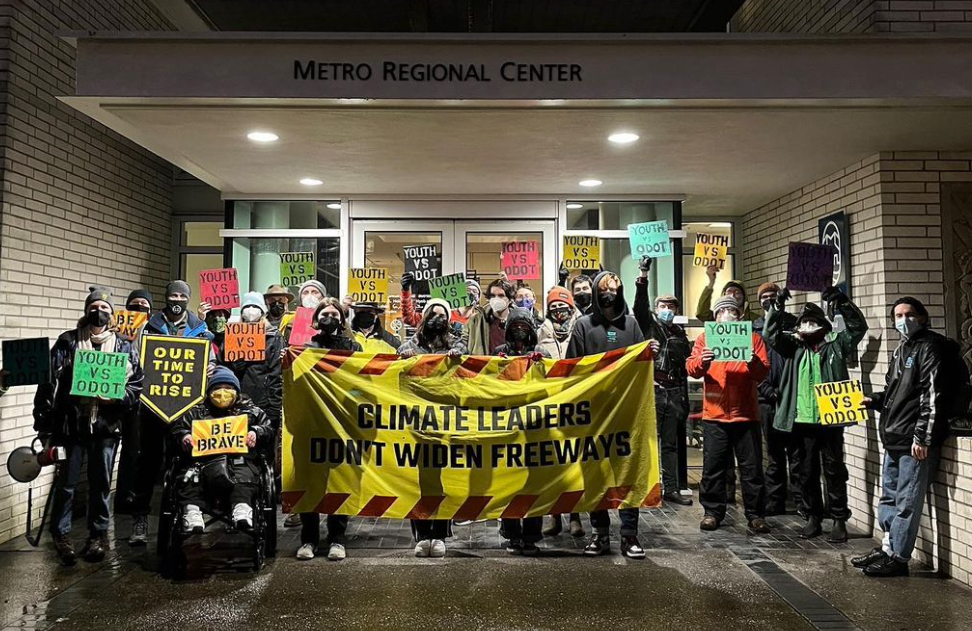Teenage climate organizers in Oregon are standing up against a freeway expansion that will threaten their generation's very future — and sending a message to adult policymakers that the connection between car dependency and the climate crisis can no longer be ignored.
Last month, youth advocates with the Sunrise Movement grabbed headlines when their co-founder, 17 year-old Adah Crandall, skipped school to confront Joint Committee on Transportation chair Susan McClain (D-Hillsboro) about her support for the misleadingly-named Interstate Bridge Replacement Project. Though it's been sold to Oregonians as a necessary renovation of the seismically-vulnerable Interstate 5 bridge, that component of the initiative would only cost $500 million, while the majority of the remaining $7.5-billion budget would be devoted to widening five miles of freeways and rebuilding interchanges to better accommodate drivers.
During the tense exchange, Crandall pleaded with McClain to "support a version of that project that is cheaper and still addresses the seismic issues and secures my generations feature by not adding freeway lanes" — an alternative which she says ODOT hasn't even studied — only to be told by the lawmaker that her concerns would be better discussed in a private appointment out of public view. Crandall and her fellow advocates, though, say they had already had private meetings with the legislator that hadn't moved the needle — and after months of protests and a particularly long and exhausting day of lobbying, they needed McClain to answer for her choices in front of the cameras.
"She won't outright say that she's opposing us," Crandall later told Streetsblog. "But she definitely isn't willing to take a stance that is nearly strong enough to meet the stakes of the climate crisis ... It shouldn't be difficult for a legislator to be able to at least say that young people's futures matter more than this highway mega-project. But she couldn't even even say that.”
This wasn't Crandall's first time standing up to powerful transportation decision-makers. As part of her work with the Youth vs. ODOT campaign, which she co-founded, she and her classmates have been protesting outside the Oregon Department of Transportation every other Wednesday for about two years, chanting their opposition against what they call "the freeway industrial complex" and scrawling protest messages about the "Oregon Department of Climate Arson" in sidewalk chalk outside the front door. Their work had earned Adah and other Sunrise members profiles in national publications the likes of CityLab and Vice, as well as access to rooms full of Portland's power brokers — though she hasn't always been impressed with the lack of imagination she's witnessed inside them.
“It's kind of fascinating to be a teenager in those committees sometimes," Crandall said. "It’s like, 'Hey; why are we sitting in this meeting, fighting over which school is going to get a grant to build a crosswalk, when active transportation is such a tiny fraction of the entire state funding, and billions and billions of dollars are going to freeways? Why are we over here arguing over the scraps instead of demanding more money from the state to actually make sure that kids like can get to school safely? ... I think young people and teenagers bring this kind of radical imagination, to see that things don't have to be the way that they've always been — that they can't be the way that they've always been. There's no viable path to having a future on this planet where we keep doing things the way that we always have. We can't afford to wait around for our futures to become quote-unquote 'politically possible.'"
Crandall's refusal to accept political deadlock isn't the only reason why she's gained so much notice as an activist. She's been honing her organizing skills since she first learned that another segment of Interstate 5 was effectively pumping diesel exhaust into the playground of the adjacent middle school she attended, which inspired students to lobby for legislation to phase out the most heavily-polluting trucks. With that same interstate due to be expanded even further into the schoolyard, though, Crandall knew her work wasn't done — and that youth like her had a critical role to play in fighting highway projects across the country.
“The freeway fight, historically, has been a lot of old white dudes with a lot of technical policy knowledge," she added. "Which is great, and important. But I do think that having a group of really fiery, enthusiastic young people who are going to stand outside the ODOT building every other week for over a year with signs and chants — that grabs the public. They see that and they realize, 'wow; young people are so committed to fighting for this thing. Maybe I should care about that.”
"Auxiliary lanes" = Freeway lanes
— Adah Crandall (@adahrae11) April 14, 2023
Freeway lanes = Climate arson #rightsizerightnow https://t.co/kUGWYjmXsp
Now, Crandall is graduating a year early to devote herself to advocacy full time, because she's "feeling the urgency of the climate crisis and [doesn't] want to spend another year in a high school classroom." In addition to launching an initiative to train middle schoolers to confidently use public transportation, she's planning to join the national Sunrise network to work on the Green New Deal for Schools campaign.
She expects that work will bring her into conflict with leaders like Rep. McClain again, and she's doing everything she can to prepare herself for those fights to come — because the stakes are too high not to.
"People would say that what I'm doing is brave. But to me, it's just kind of the only option," Crandall said. "Like, if they're not going to listen to us in the public hearings, we're gonna confront them in the hallway. Because we have to be heard. Because we're terrified."






